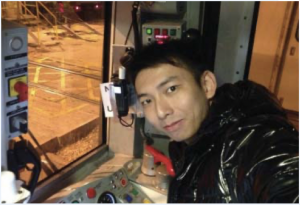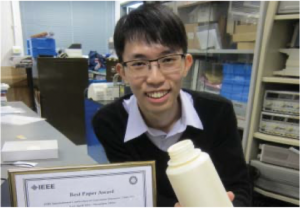Bachelor of Science in Computing and Networking
(BSCICN)/
Bachelor of Science With Honours in Computing and Networking (BSCICNH)
Distance Learning Mode Part-time
This programme aims at producing graduates who are well versed with the principles and application of computing and networking.
Graduates will be equipped with the know-how to apply computing and networking technologies in business and industry leading to careers as computing and networking engineers, analysts, managers and consultants.
The Honours degree programme further equips graduates with in-depth understanding in important areas of computing programming and database systems, computer architectures, systems design, network management and programming.
Upon completion of the Bachelor of Science in Computing and Networking, students will be able to:
- Perform the work of a computing professional competently.
- Utilize fundamental computing and mathematics principles to solve computing problems.
- Design and develop computer networks.
- Write programs with a high level programming language.
- Apply, independently or collaboratively, software engineering methods for developing software to meet practical budgetary and operational constraints.
- Demonstrate proficiency in language communication and information literacy.
- Deal with current issues in computing by keeping abreast of professional knowledge and techniques in the global context.
- Recognize the need for, and engage in life-long learning.
Upon completion of the Bachelor of Science with Honours in Computing and Networking, in addition to (a) – (h), students will also be able to:
- Discuss important issues in advanced areas in computing.
- Apply knowledge and skills in important topics such as database systems, object-oriented programming, networking and switching technology, and network programming in developing computing solutions.
Characteristics
- Multi-exits for reaping your rewards quicker
- Credit exemption allowing a shorter time to get a degree
- Entry pathways for students with a computing Higher Diploma and Associate Degree to complete an ordinary degree with as few as 40 credits.
- Distance learning study mode allowing greater flexibility in studying
- Open education policy allowing admission of anyone 17 years of age and with a HK local address
Programme Structure
Bachelor of Science in Computing and Networking (BSCICN)
To be eligible for the award of the degree of Bachelor of Science in Computing and Networking, a student shall:
- obtain 90 credit-units as prescribed below, of which no more than 30 credit-units shall be at 1000-level, and at least 24 credit-units shall be at 3000-level and/or 4000-level:
- 18 credit-units from courses labelled FD in Table 1;
- 36 credit-units from courses labelled CD in Table 1;
- 6 credit-units from courses labelled D1 in Table 1;
- 12 credit-units from course labelled D2 in Table 1;
- 3 credit-units from any courses at 1000/2000/3000/4000-level offered by the University;
- 6 credit-units of University English courses labelled UE in Table 1;
- 9 credit-units of University Core courses labelled UC in Table 1; and
- attain the CGPA for graduation as prescribed in the Regulations for the Award of Undergraduate Degrees.
Bachelor of Science with Honours in Computing and Networking (BSCICNH)
To be eligible for the award of the degree of Bachelor of Science with Honours in Computing and Networking, a student shall:
- obtain 120 credit-units as prescribed below, of which no more than 30 credit-units shall be at 1000-level, and at least 24 credit-units shall be at 3000-level and 24 credit-units at 4000-level:
- 18 credit-units from courses labelled FD in Table 1;
- 36 credit-units from courses labelled CD in Table 1;
- 12 credit-units from course labelled D1 in Table 1;
- 24 credit-units from course labelled D2 in Table 1;
- 6 credit-units from course labelled D3 in Table 1;
- 9 credit-units from any courses at 1000/2000/3000/4000-level offered by the University with no more than 3 credit-units at 1000 level;
- 6 credit-units of University English courses labelled UE in Table 1;
- 9 credit-units of University Core courses labelled UC in Table 1; and
- attain the CGPA for graduation as prescribed in the Regulations for the Award of Undergraduate Degrees.
The programme regulations and the courses on offer are subject to revisions.
Follow the requirements exactly. Email us for consultation.
Table 1.
| Course Code | Course Title | Credit-units | Course label | Earliest Term Available |
| IT 1010SED | Introduction to Information and Communications Technology | 6 | FD | 2023 Autumn |
| IT 1230SED | Introduction to Internet Services and Applications | 6 | FD | 2023 Autumn |
| MATH 1210SED | A Foundation in Pure Mathematics | 6 | FD | 2023 Autumn |
| COMP 2010SED | Computing Fundamentals with Java | 6 | CD | 2024 Autumn |
| COMP 2120SED | Network Programming and Design | 6 | CD | 2023 Autumn |
| COMP 2580SED | Computer Programming and Problem Solving | 6 | CD | 2023 Autumn |
| COMP 2600SED | Computer Architecture and Operating Systems | 6 | CD | 2023 Autumn |
| COMP 4560SED | Software Engineering and Project Management | 6 | CD | 2024 Autumn |
| ELEC 3320SED | Computer Networks | 6 | CD | 2024 Autumn |
| COMP 3110SED | Advanced Java Programming and Mobile Application Development | 6 | D1 | 2024 Autumn |
| COMP 3590SED | Relational Databases: Theory and Practice | 6 | D1 | 2024 Autumn |
| COMP 4680SED | Networks and Distributed Systems | 6 | D2 | 2024 Autumn |
| COMP 4910SED | Machine Learning and Applications | 6 | D2 | 2024 Autumn |
| ELEC 3240SED | Computers and Processors | 6 | D2 | 2023 Autumn |
| ELEC 4230SED | Information Theory and Digital Communications | 6 | D2 | 2024 Autumn |
| COMP 4500SED | Applied Computing Project | 6 | D3 | 2024 Autumn |
University Core Courses |
| UNI 1001ABW | University Core Values | 2 | UC | 2024 Spring |
| UNI 1011ABW | Social Responsibilities | 1 | UC | 2024 Autumn |
| UNI 2001BEW | Effective Communication and Teamwork | 3 | UC | 2024 Autumn |
| UNI 3001BEW | Entrepreneurial Mindset and Leadership for Sustainability | 3 | UC | 2025 Spring |
University English Courses |
| ENGL 1101AED | University English: Reading and Writing | 3 | UE | 2023 Autumn |
| ENGL 1202EED | University English: Listening and Speaking | 3 | UE | 2024 Spring |
Remarks:
* Students are required to take the course in/after the mentioned academic year and term.
Admission Requirement
Admission is open to anyone in Hong Kong over the age of 17.
Course Scheduling
Most computing core courses are offered in the Autumn term, and a few are offered in the Spring term. Refer to the following links for the details.
https://admissions.hkmu.edu.hk/dl/courses/
Credit Exemption
Students with recognized qualifications such as Higher Diploma or Associate Degree may be granted credit exemption.
- Holders of local recognized HD/AD in computing should apply through the BSCICNH1/BSCICN1 pathways. (link to be updated)
- Holders of other qualifications including partially completed qualifications should apply through advanced standing.
















